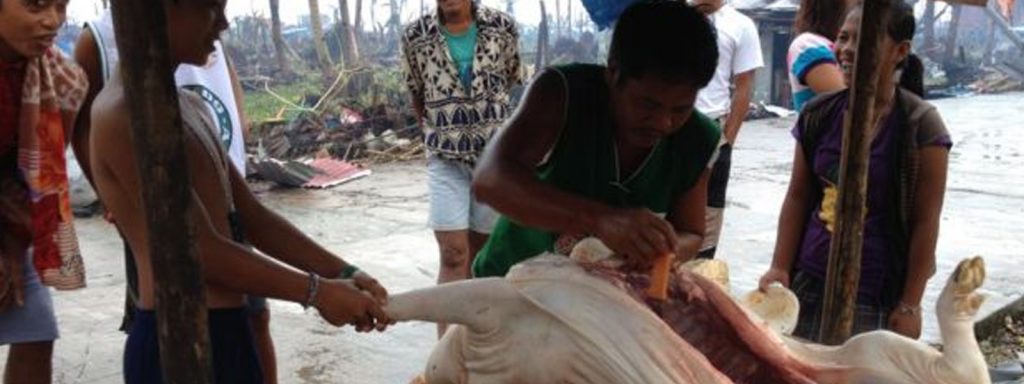For one man in Guiuan, the simple slaughter of a pig offers a way forward
When Salvador Duran woke the other morning, he knew that this would be a good day.
He got up and he walked out of his wooden hovel home on Guimbaolibot Avenue and he had a pee. Then Salvador went back into his shack and put on his vest shirt. It sported the logo of his favourite basketball team, the Aces, and had his name on the back, above the number 24.
It was a bit after 5am and still half dark. But a cock was crowing and the promise of a sunrise lay to the east, out over the sea.
This day would definitely be a good one. He was sure of that. It would be better than the terrifying day Typhoon Haiyan, named Yolanda in the Philippines, swept away his home; better than lots of the lousy days after when he and his family struggled to survive.
Salvador knew this day would be a good one because he had something to kill.
He had bought a pig and he was going to slaughter it and butcher it and feed his family royally and sell some of the meat as well so that he had money for the days ahead.
The three-month-old, unknowing source of Salvador’s good spirits was tethered to the branch of a fallen tree that lay opposite his house. It was snuffling around in the sand and the mess and the debris of the storm, looking for a morsel . . . without much success, it seemed.
There would be no last meal for the pig. Still, he carried on.
Behind him, Salvador built a fire on the edge of the concrete road. First, he got some lumps of rubble to make a hearth. No difficulty there; if there’s one thing Guiuan has an oversupply of these days it is rubble.
Salvador built two side supports for his pot, using two lumps of concrete – one on top of the other; two each side of the fire.
Blazing fire
He got some wood. No difficulty there either. He put some sticks between the block supports and lit his fire. Soon it was blazing in the dawn light, flames licking up the side of a pot filled with water, blackening it, and attracting the presence of children.
“Very nice,” he pronounced to me smiling, looking back at the pig. “Buy one, get one free!”
And he cackled loudly at his joke with the children joining in. We all looked at the pig whose fate was well sealed. I blessed it, with the exaggerated hand movements of a bishop.
Salvador and the kids were in stitches.
When the water in the pot was boiling, the pig was led on to the road that would be his execution block.
Salvador lay the pig on its side. It went willingly, passively and without squealing. Did it know? The knife went into his chest just by his front left trotter, directly into the heart. The pig died as close to instantly as it was possible under the circumstances.
Quickly, Salvador got to work. He scooped out boiling water and, with a machete-like knife, began scraping the outer skin and hair from the corpse. It was like scaling a fish.
The kids, half a dozen in number, squatted on their hunkers and watched intently, not saying a word. Salvador and I chatted as he worked. He and his family survived the typhoon because they went to an evacuation shelter.
But they lost their wooden shanty home. What they lived in now was all that had been able to cobble together from the debris in the fortnight since the storm. He needed to rebuild much more, he said, but he had no money for nails.
When the scaling was done, he washed the mess off the road with the remaining water. He turned the pig on its back and slit open its belly.
He cut the lower intestine and the oesophagus and lifted the heart and liver out into a black plastic basin. He cupped his hands and went back inside the abdomen, to scoop out the blood. Then he grabbed hold of the upper parts of the gut and, from beyond the pig’s tail, pulled and pulled and pulled until the whole guts came free.
He slapped them on the ground as a matador might his cape following an exaggerated pass of the bull.
Sellable pieces
The pig ready for dismembering, Salvador washed it once more before slapping it down on his butcher’s table in front of his house. He decapitated the pig, displaying the head on the table; he cleavered the torso in half, then quartered it; he removed the trotters; and then butchered it into sellable pieces.
The sun was fully up now; Guiuan going about its business . . . inasmuch as there is business to be gone about. The emergency aid teams – a united nations of helpers – were all on the move. Locals on bicycles and motorcycles, bicycle taxis and motorbike sidecar taxis, were beginning to clog up Guimbaolibot Avenue.
From an open-sided living room in Salvador’s hovel looking out at the City Hall, his mother, grandmother and brother sat watching as Salvador and some of his six kids set up shop, ready for business and knowing that tonight’s dinner – and a good few more besides – was sorted.
A good start to a good day.
I gave him 1,000 pesos, about €17. “Nails for the house,” said Salvador. “Thank you.”
Yes, he always knew that this day would be a good day.
